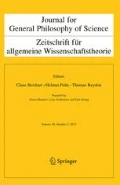Summary
The article formulates a criticism of Wittgenstein's later philosophy which, in its substance, I would like to think, is fairly the same as the (hermeneutic) criticism issued by Apel and Habermas in the sixties. Contrary to these philosophers, however, I try to make the point by focusing on the distinction between language game and language, respectively between intralanguage relations of ‘family resemblance’ (between language games) and interlanguage translation relations. The notion of a ‘complete language’ is introduced — ‘completeness’ of a language being, roughly, its possibility in principle of being translated into any (other) language — and the criticism of Wittgenstein is formulated as the allegation that he does not, or will not, acknowledge such a concept of completeness.
So far the contents of the first part of the article. The rest of it assembles some hints, remarks and reminders which bear upon the question of the ‘completeness’ of a language. These considerations include comments on the conditions of translatability, on the performative (agent's) knowledge or ‘intention-in-action’ of the acting person, on Habermas' concept of communicative competence and on the notion of a responsible subject of action. It is alleged that to speak of ‘translation’ and ‘reporting an event’ as language games is misleading.
Similar content being viewed by others
Bibliographie
Apel K.-O.: 1973,Transformation der Philosophie I, II, Suhrkamp, Ffm.
Apel, K.-O. (Hg.): 1976,Sprachpramatik und Philosophie, Suhrkamp, Ffm.
Apel, K.-O.: 1979a, „Sprechakttheorie und Begründung ethischer Normen“, in K. Lorenz (Hg.):Konstruktionen versus Positionen I, II, Walter de Gruyter, Berlin, New York.
Apel, K.-O.: 1979b,Die Erklären: Verstehen-Kontroverse, Suhrkamp, Ffm.
Apel, K.-O.: 1980, „Zwei paradigmatische Antworten auf die Logos-Auszeichnung der menschlichen Sprache, in Pfafferott/Strohmeier (Hg.),Perspektiven der Kunst- und Kulturphilosophie, Bonn.
Bennett, J.: 1964,Rationality, Routledge & Kegan Paul, London.
Böhler, D.: 1985,Rekonstruktive Pragmatik, Suhrkamp, Ffm.
Fichte, J. G.: 1983,Gesamtausgabe der Bayrischen Akad, d. Wissenschaften (Hrsg. R. Lauth, H. Gliwitzky), Frommann Verl., Stuttgart.
Habermas, J.: 1970,Zur Logik der Sozialwissenschaften, Suhrkamp, Ffm.
Habermas, J.: 1976, Universalpragmatische Hinweise auf das System der Ich-Abgrenzungen, in Auwärter/Kirsch/Schröter (Hg.),Kommunikation, Interaktion, Identität, Suhrkamp, Ffm.
Habermas, J.: 1981,Theorie des kommunikativen Handelns, I, II, Suhrkamp.
Habermas, J.: 1988,Nachmetaphysisches Denken, Suhrkamp.
Habermas, J. und Luhmann, N.: 1971,Theorie der Gesellschaft oder Sozial-Technologie, Suhrkamp, Ffm.
Hacker, P. M. S.: 1972,Insight and Illusion, Oxford.
Hacker & Baker: 1984a,An Analytic Commentary on Wittgensteins Philosophical Investigations, Basil Blackwell, Oxford.
Hacker & Baker: 1984b,Essays on the Philosophical Investigations, Basil Blackwell, Oxford.
Kant, I.: 1911,Grundlegung zur Metaphysik der Sitten, Akademieausgabe.
Kripke, S.: 1982,Wittgenstein on Rules and private Language. Basil Blackwell, Oxford.
Kuhlmann, W.: 1985,Reflexive Letzbegründung, Karl Alber, Freiburg/München.
Lewis, D.: 1972, ‘General Semantics’, in Hintikka/Harman (eds.),Semantics for Natural Language, Dordrecht.
Lyotard, J.-F.: 1977,Patchwork der Minderheiten, Merve Verl., Berlin.
Lyotard, J.-F.: 1982,Das postmoderne Wissen, Bremen.
Melöe, J.: 1978, ‘Om Øfstis bok “Språk og fornuft”. Pluss endel notater om språk og språkspill’, inNorsk filosofisk tidsskrift, nr. 2.
Melöe, J.: 1983, ‘The Agent and His World’, ‘Theaitetos' Wagon’ and ‘The Picture in Our World’, all in G. Skirbekk (ed.),Praxeology, An Anthology, Universitetsforlaget, Oslo/Bergen.
Melöe, J.: 1986, ‘Über Sprachspiele und Übersetzungen’, in Böhler/Nordenstam/Skirbekk (Hg.),Die pragmatische Wende, Suhrkamp, Ffm.
Taylor, Ch.: 1975,Hegel, Cambridge Univ. Press, Cambridge.
Taylor, Ch.: 1985,Philosophical Papers, Cambridge Univ. Press, Cambridge.
Tugendhat, E.: 1976,Einführung in die sprachanalytische Philosophie, Suhrkamp, Ffm.
Wittgenstein, L.: 1960,Schriften, Suhrkamp, Ffm.
Wittgenstein, L.: 1970,Lectures and Conversations on Aesthetics, Psychology & Religious Belief (ed. Cyril Barrett), Basil Blackwell, Oxford.
Wittgenstein, L.: 1967,Zettel, Basil Blackwell, Oxford.
Øfsti, A.: 1975,Språk og fornuft, Universitetsforlaget Oslo, Tromsø.
Øfsti, A.: 1978, ‘Om språkspill og “komplette” språk’, Svar til Jakob Melöe.NFT nr. 3.
Øfsti, A.: 1985, ‘Act Performance and Description’, in Gullvag/Høibratten (eds.),Essays in Pragmatic Philosophy, Norwegian Univ. Press, Oxford Univ. Press.
Øfsti, A.: 1988, Strawsons Paralogismus, inKants transzendentale Deduktion und die Möglichkeit von Transzendentalphilosophie, hg. von Forum für Philosophie, Bad Homburg, Suhrkamp, Ffm.
Author information
Authors and Affiliations
Additional information
Dieser Aufsatz erscheint als Ergebnis (bzw. als Beitrag zu) einer Debatte, die ich mit Jakob Melöe (Tromsø) geführt habe. Die bisherigen Beiträge sind: Øfsti (1975), Melöe (1978), Øfsti (1978) und Melöe (1986).
Rights and permissions
About this article
Cite this article
Audunøfsti Sprachspiel vs. vollständige Sprache. Zeitschrift für Allgemeine Wissenschaftstheorie 21, 105–133 (1990). https://doi.org/10.1007/BF01801418
Issue Date:
DOI: https://doi.org/10.1007/BF01801418




